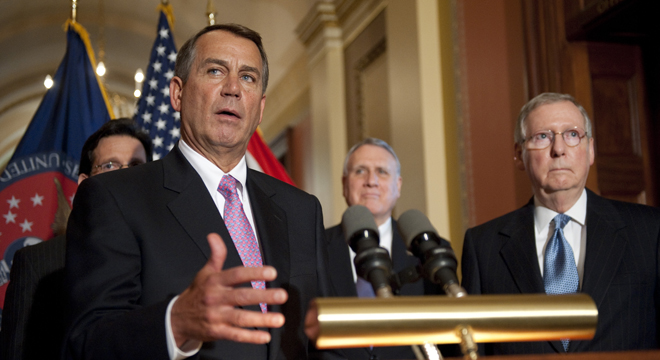Republican political operatives want to remind everyone who’s paying attention that conservative House members are itching for a fight, and impossible to control.
More than half of the GOP conference, they warn, is prepared to breach the debt limit — despite catastrophic economic risks — and many more still would be willing to let appropriations lapse at the end of March, to trigger the same kind of government shutdown Newt Gingrich lead in 1995.
They also want you to remind you that President Obama was just as adamant in 2011 that he would not allow Republicans to threaten a debt limit breach as a way to leverage policy.
“Just so everyone’s clear, the position the President took today was the same one he started with in 2011,” John Boehner’s spokesman Brendan Buck tweeted after President Obama’s Monday press conference.
These claims are beginning to look like wishful thinking.
Over the past several days, House and Senate Republicans, as well as influential conservative advocates and media figures, have joined Newt Gingrich, Wall Street Journal editors and others pressing Republicans to give up the ghost.
In an editorial board meeting with the Fairbanks News-Miner, Sen. Lisa Murkowski (R-AK) said her colleagues are keeping quiet, but most agree that threatening not to raise the debt limit is not tenable.
“If you incur an obligation, you have a responsibility to pay for that,” Murkowski said.
Her colleague, Sen. Susan Collins (R-ME) echoed this sentiment to the Washington Post through her spokesman. “Senator Collins recognizes that the debt ceiling is going to have to be raised because the U.S. cannot default on its obligations to pay for spending that has already occurred.”
In the House, Republicans are beginning to accept what Boehner and others have argued — that the debt limit only provides illusory leverage, and that the party should dig its heels in over the sequester and expiring appropriations.
“As I’ve said to some who said, ‘Scott, just shut her down, just stop. Don’t – you know, when you get to that debt limit, under no circumstances raise it,’ I start going through this scenario,” Rep. Scott Rigell (R-VA) said on CSPAN Tuesday morning, explaining, correctly, the chaotic consequences of failing to increase the debt limit. “Say, ‘Okay, let’s just walk through that.’ What we’re basically saying, then, is that we’re going to balance the federal budget not over time, but in a moment; in a day. So the next morning, what are we going to pay? Do you think we ought to pay the troops? Most people would say, ‘Oh, gosh, absolutely.’ Well, what about those receiving Medicare? ‘Well yeah, that needs to – we need to do that. They’re dependent on that.’ What about Social Security? ‘Well certainly, we earned that. We paid into that.’ And you just go down the line. Most folks, if you really walk through it, it’s not a good scenario.”
Rigell acknowledged that the debt limit scenario could play out in any number of ways, but that raising the debt limit, even briefly, is a “mathematical imperative.”
“Am I open to raising the debt ceiling, maybe to the chagrin of some and over the objection of some?” he asked rhetorically. “I am. We got into this wilderness over a long period of time. It’s going to take us a while to get out of it.”
On MSNBC Tuesday, Rep. Greg Walden (R-OR) would not rule out the possibility that Republican leaders will ultimately allow a clean or non-controversial debt limit bill to come to the floor, even if it can only pass with overwhelming support from Democrats.
Outside the Capitol, influential conservatives are counseling caution. Americans for Prosperity — a messaging and advocacy shop backed by the Koch brothers — says Republicans must show restraint in the debt limit fight. That’s not just because failing to increase the debt limit would create economic mayhem, but because focusing on debt — as opposed to spending per se — allows Democrats to argue, accurately, that revenue is an important debt reduction tool. The position that not increasing the debt limit might be better than persisting with the status quo is untenable enough. Arguing further that raising more revenue would be worse than both outcomes would get Republicans laughed out of town.
The conservative National Review proposed a more novel idea — a carve out that would allow the government to borrow above the debt limit, but only for the purpose of servicing existing debt. That would presumably take the prospect of default off the table, but would leave every other function of government exposed to deep, immediate spending cuts or delays and thus threaten to plunge the country back into a recession. That’s not a politically viable threat either, but the proposal in and of itself indicates that many conservatives recognize the GOP actually holds a losing hand.










